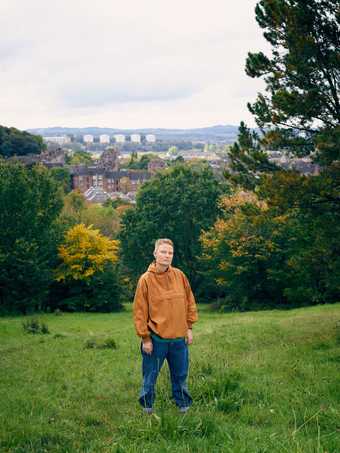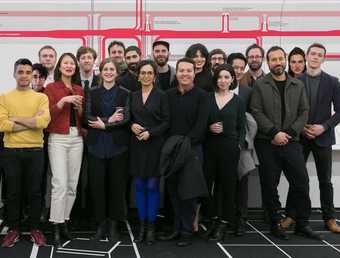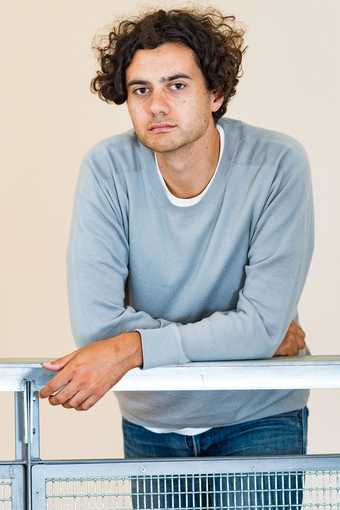Charlotte Prodger is a British artist working with moving image, printed image, sculpture and writing. Her work explores issues surrounding queer identity, landscape, language, technology and time.
Biography

Portrait of Charlotte Prodger
Photography © Emile Holba 2018
Charlotte Prodger was born in Bournemouth, UK in 1974. She studied at Goldsmiths, London and The Glasgow School of Art.
Recent solo exhibitions include: BRIDGIT/Stoneymollan Trail, Bergen Kunsthall; Subtotal, Sculpture Center, New York (2017); BRIDGIT, Hollybush Gardens, London; Charlotte Prodger, Kunstverein Düsseldorf (2016); 8004–8019, Spike Island, Bristol; Stoneymollan Trail, Temple Bar Gallery, Dublin (2015); Markets, Chelsea Space, London; Nephatiti, Glasgow International Director’s Programme, Glasgow (2014); Percussion Biface 1–13, Studio Voltaire, London; Colon Hyphen Asterix, Intermedia CCA, Glasgow (2012) and Handclap/Punchhole, Kendall Koppe, Glasgow (2011). Recent group exhibitions include: Always Different, Always the Same: An Essay on Art and Systems, Bunder Kunstmuseum, Chur; ORGASMIC STREAMING ORGANIC GARDENING ELECTROCULTURE, Chelsea Space, London (2018); British Art Show 8 (2016); Weight of Data, Tate Britain, London; An Interior that Remains an Exterior, Künstlerhaus Graz (2015); A Survey of Recent Artists’ Film and Video in Britain, Tate Britain, London; Annals of The Twentieth Century, Wysing Arts, Cambridge (2014) Holes In The Wall, Kunsthalle Freiburg and Frozen Lakes, Artists Space, New York (2013). Prodger received the 2014 Margaret Tait Award and 2017 Paul Hamlyn Award.
Prodger works with moving image, printed image, sculpture and writing. She has been nominated for the 2018 Turner Prize for her solo exhibition BRIDGIT/Stoneymollan Trail at Bergen Kunsthall (2017) comprising two single-channel videos. Moving image has been at the core of Prodger’s work for two decades. Its ever-evolving formats are inextricably bound to the autobiographical content of her work. She has mined the material properties of numerous moving image formats, not just because they inherently get replaced over time, but because she is fascinated by their formal parameters and socio-political histories; the sticky relationship between form and content. Prodger’s recent videos set up complex tensions between the body, landscape, identity and time.
BRIDGIT is titled after the eponymous Neolithic deity whose name has had multiple iterations across different geographical locations and points in history. BRIDGIT was shot entirely on Prodger’s iPhone, which she approaches as a prosthesis or extension of the nervous system, intimately connected to time, social interaction and work. Body and device become extensions of each other, and the work becomes a unified meditation on shifting subjectivity.
Stoneymollan Trail is named after an ancient ‘coffin road’ on the west coast of Scotland. A non-linear miscellany of visual material from her personal archive (shot between 1999 and 2015), it traces a history of recent video formats as well as the artist’s personal history. Much of Prodger’s work looks at what happens to speech – and the self for which it is a conduit – as it metamorphoses via time, space and technological systems. For voiceovers, she frequently asks friends to read out her own diaristic content, while she inhabits other subjectivities by re-speaking the words of people living and dead: friends, anonymous YouTube users and historical figures of influence. The material perpetually shifts around but is locally grounded in its means of production – based in queerness, communality, technology, language and loss.
Charlotte Prodger is 44 and lives and works in Glasgow.
Turner Prize 2018 was at Tate Britain, 26 September 2018 – 6 January 2019.



